Sign of Ifa Irete Meyi: Meaning, Sayings and Tips

What is born in the odu of Ifa Irete Meyi?
- That IKU respects chickens.
- Squaring the circle.
- What is the Odu of «Love Personified».
- Let IKOFAFUN wear 3 Ikines.
- The astral body (The spirit).
- That the Ifá priest cannot tear the seeds of the Ikín plants, except to build his okpel.
- The strength of the hands and teeth.
- OYA's scythe.
- That with this Odu, the son of OGUN is not made Ifá, because he will never progress.
- The secret of the OLOFIN crown.
- The consecration of OYA and OGUN.
- IKU's pact with ORUNMILA.
- The ODUDUWA spirit.
- Ducks, chickens, toties, pigs.
- Do Ituto in life.
- The bull's head for OLOKUN.
What does the sign Irete Meyi talk about?
- They speak of the attacks, boils, chicken pox, pimples, pestilential fevers, bubonic plague, leprosy, syphilis, pleurisy, scurvy, leukemia, laxity (impotence), otitis, frequent loss of weight, prostration of the waist towards under.
- Here: Ants are not killed.
- When you see this Ifá, you don't drink water until 12 at night.
- He has one foot on the land and the other in the sea.
- Deer is sacrificed to ORUNMILA.
- It is the Odu that is marked at the entrance of the house and a dove is sacrificed to him to drive away the danger that lies in wait for him.
- The shade of fruit trees speaks.
- The goat became Eshu's food.
- Man's uneasiness began for the struggle for material goods.
- The person is an artist by birth, aptitudes for creation.
- OSUN is prepared up to the knee.
- The mayomberos carried the ox jar and loaded it with sacred materials and put a mirror on it to see the future.
The sign Irete Meji points out:
- The Odu reiterates the elimination of human beings by the sacrifice of animals.
- The Odu prescribes that the Awó learn the songs of Ifá to apply them.
- The Iyefá is made of Ikines shell.
- ELEGBARA crowned OLOFIN with an Ada, with 16 parrot feathers and 16 ivory manacles.
- Ifá notifies the Awó 16 days before his death.
- It was where OGUN got stupid and why OGUN's children don't interpret Ifá.
- The OGUEs were from OGUN.
- SHANGO was born in Takua land and in other lands he was crowned King four times.
- He cannot hang up his clothes because he is late.
- OYA was captivated or enslaved by OGUN.
- OGUN lost power to OYA and lost OGUE.
- Women lost the power of OLOFIN and why they cannot have it.
- OSHUN was a midwife.
- OSHUN was a close friend of NANU, sister and wife of AZOJUANO.
- Sheep and chicken are given to IKU to drive her away.
- ODUDUWA went to teach the Congolese, but they did not learn.
- The Ifá crown brings luck to Ilé.
- The AKAN (crab) changes his house.
- Blankets are not worn over the body.
- The herbs are: Herb the blood, Caí simón and lantern.
You may also like: Treaty of the sign of Ifa Osa Meyi
Recommendations of the Irete Meyi sign:
- When this Odu comes for a woman, you have to make him stop urgently.
- The son of OGUN is not made Ifa. 16 stones are consecrated to him, with each Odu Meji marked on them and he lives within his AWOFAKAN.
- Here the IGBA ODU Deity is requested with sixteen halves of bread and cocoa, for sixteen days.
- Use a cane prepared by an Ifá priest.
- Offering a drum to OSHUN is advised. Before he must sacrifice for this Deity what Ifá says and wash his house with: Purslane, Dead scare and Open the way.
- After preparing OSUN up to the knee, two white doves are sacrificed to him, together with the feet of the person concerned. The OSUN is deposited with ORUNMILA.
- Irete Meyi speaks of request and thoughts. It reaches the end without incident. Women demand affection.
- To have children, goat to Eshu, hen, deer and goat to Ifá and a rabbit to the Ancients of the Night. Everything is put in a hole with a mirror and three handkerchiefs tied by the ends, which reach the bottom of it.
- To avoid danger of death, go to Ifá with Iyefá from ORUNMILA, everything is cooked and goes to a crossroads.
- They will impose three tests on you. To be victorious, he must sacrifice goat to Eshu, 2 roosters to SHANGO and ram to EGUNGUN.
- He talks about sinking and problems with the law, for which he must sacrifice 2 chickens and a goat to OYA and a goat to Eshu.
Peel yourself systematically, so that it grows as your hair does. - Serve the head frequently, since the Odu enunciates the cutting of the hair in the Igbodu with the razor, which whenever it cuts it utters a moan Idi Osa, hence the children of OGUN, who also have that Odu, do not go to the Igbodu.
- The Oddun Irete Meyi marks tears of suffering.
- Sleight of hand is prohibited.
- The fortune teller must study his profession in depth, because he believes that he knows a lot and is only ignorant.
- In this sign, a bronze and ivory crown is prepared, adorned with sixteen parrot feathers. It is washed with the appropriate leaves and a goat is sacrificed to it, along with Ifá (before, giving a goat to Eshu.) It is the only crown that is put on top of the other (coronation of Ifá).
Prohibitions of the sign of Ifa Irete Meji:
- Luck is coming, you must do Ebó to reach it.
- Do not take it, you can fall asleep and lose.
- Be patient, as a woman will bring you luck.
- He will have a seat and wealth for YEMAYA.
- OGUN ruled on the strength and fear he inspired.
- The husband has to be Awó de ORUNMILA to be equated with the woman, since he acquires supernatural powers.
- Avoid going to the plaza and public places, make sacrifice with blanket and epo to erase the things of the past. Do not wear a blanket on your body.
Sayings of the Odu of Ifa Irete Meyi:
- The judge who warns a lot, does not want to find guilty.
- The Sun cannot with the umbrella.
- If the people saved me, they saved themselves; if they don't help me, they will be lost.
- A good gesture of kindness deserves another, while a bad gesture destroys mutual relationships.
- By planting three trees I will achieve my prosperity.
- The blood is resurrected.
- He who raised the dead and is among the living.
- Art shapes my life.
- The one who mocked death.
- I have to be careful not to fall into the hole of prosperity.
- Only smallpox can insult IKU without risking death.
- The one who moves his legs.
- The Earth insulted death and it forgave her because she is his sister.
- A comb cannot comb a bald man, a razor cannot shave a hairless man.
- OLODUMARE never gets sick and is never sad, we will never hear of his death, unless the liars lie.
Ifa Irete Meyi says:
When this Irete Meyi manifests during initiation in Igbodu, the initiate must plant three trees as follows:
A rooster for the ege plant (isa in Benin), the head of a boa to sow ebe (alaho in Benin), the father ram to sow ukpogun kperegun and the stone taken from the bottom of a river, which is used to prepare Eshu for him.
This is the secret by which ORUNMILA is capable of making its children rich and prosperous.
When the sign of Ifa Irete Meyi comes out in divination, the person is advised to take care of his servant, who is planning to betray him or lie against him.
He is sad and wants to cry. You are a believer in your own way and, sometimes, you don't even believe in yourself, don't throw anything away from Santo because you can stop insane.
Put music in your house and you will achieve what you want. When there are festivities in your house, wash the house with Atiponlá and papasimí.
He had a tragedy with a fat person. In his house there is a very strong person, who belongs to another religion, but ORUNMILA will put an end to it. In your family there is a person who is crazy, that's why they say that you are crazy too, reserve your mental imaginations because that's why they will call you crazy, be more mature. -
Prayer of the Odu Baba Irete Meyi:
EYELEMERE AKOLOMORE SUPPORT AMONI ORUN ONI BARABANIREGUN
ORUN MILAMO IKA ONI AWO AKOLOMORE ORUNMILA LORUGBO.
Suyere Oddún Irete Meji:
ARIKU MARIWA, ARIKU MARIWA OÑIKI BAKUODIDEO
ARIKU MARIWA, OSHE MENIEI, OSHE MENIEI
You may also like: Odi Meyi, Odu of Ifa.
Ebbo of the Odu Irete Meyi Ifa:
Paraldo from IRETE MEJI.
5 OSHUN herbs for Omiero. Buttercup, Paradise, Sassafras, Imo OSHUN. Is given
blood to the Omiero with a yellow pullet, with which the person is cleaned; 8 kinds of
different drinks. The hen is given a candle and taken to the river. When he returns, he bathes the
person. Being dangerous, the Awó becomes Paraldo with 1 direct cock.
Secret Ebbo of the Irete Meyi sign.
3 peony seeds, 3 bottles of brandy, 3 bottles of honey, 3 spears, 3 small stones, 1 rooster, 2 yellow hens, 3 ekó, 3 candles, jutía and smoked fish, yellow, red and white cloth, 2 coconuts, a lot of money.
Secret:
1 güirito with earth from three corners, river sand, 5 small river stones. You give it chicken blood and you keep it behind the door. This ORUNMILA distributed it to all his children.
Work for the Awó Irete Meji.
He gives ELEGBARA a rooster, put in a basket, because ELEGBARA crowned OLOFIN with a beautiful crown of 16 parrot feathers and 16 ivory medals, which the Awó uses when he has OLOFIN.
Advice from the oddun of Ifa Irete Meyi:
- It cannot open or cross holes.
- The deer does not hear through the ears, but through the front legs. This is your virtue, take care of your legs and arms.
- Send to do Santo, at the most one year. Put a leg of deer (Agbani) to your Ifá. Ifá from land Iyesá, they call him EYELEMERE because he is the one who goes down to the land of the EGUN and returns to that of the living.
- Put a piece of deer antler to IKOFAFUN and AWOFAKAN.
- When Irete Meyi goes out in Osobo, OLOFIN is given 16 akará, begging him for 16 days and sleeping with a white and green hat.
- The first one that Santo did was ODUDUWA and Ifá ORUNMILA made him, so the first to cut his hair and use a razor is the Awó with Suyere: ISURRO EBO ORI, ASHE GBA DI KOLA.
- When there are festivities in the house, after it is over, the ilé is scrubbed with Omiero de purslane and Atiponlá.
- Sign of good omens for traveling.
- The money is kept in a bag with fish and roasted corn.
- 3 handkerchiefs are prepared, one white, one yellow and one blue; they are joined at the ends and put on your Guardian Angel, using it from time to time.
- Women outside the house bring luck.
- If you are building a house, suspend construction for some time. You must offer a goat to Eshu.
- If the woman has six children, she must sacrifice because she can lose three (with palm oil, sponge, soap, comb, okra, atare, hutía and smoked fish, roasted corn, rabbit to the Elders of the Night and goat to Eshu.
For the initiated Awó, you need to do the following:
- Plant an Ege tree and sacrifice a rooster to it.
- The head of a Boa to sow it.
- The father ram and sow it. Find a river stone for your Eshu.
Thus Ifá makes its children rich or poor.
For health and prosperity, make the following sacrifice: dove with dove's egg, black clothes, cornbreads, salted grains, everything is wrapped in black cloth, the whole body is rubbed and buried in a swamp in the river.
Meaning of the Sign of Ifa Irete Meyi
The Odu "Irete Meyi" is the magma of the Earth, it is female, daughter of ELEMERE GUASA and OLOMU.
It is the sign of the Earth, it dominates everything that is death.
It is Saint Lazarus himself, in space.
Its colors are: red, gray and blue; the day of the week, Wednesday. Your planet is KOLE ABE (Mercury). Its metal, Quicksilver.
You cannot use indigo or eat ekrú, adalú, guinea, ekó, corn stew, Johnson banana, chicken, sesame, peanut or millet.
Courageous Odu, you have to be brave and do EBO to eliminate the enemies.
IRETE MEJI is in charge of resurrecting the dead. That's why it's called EYEMERE, it laughs at death, insults it and IKU can't do anything.
The Awó of this sign will know what is going on, be it good or bad. Use OSHOSI and AZOJUANO as defense.
IRETE MEJI says that the Earth is smooth and does not present abnormalities, but if you explore it you will discover skeletons, corpses and excrement. The Odu receives on Earth everything discarded by life, lives on the seashore.
The Odu is long-lived.
In this Ifá, OGUN and OSANYIN respect each other, like OLOKUN and OSANYIN.
In the Odu you cannot walk without OGUN or OSHUN, if you want to be well.
The Awó of this Odu wears a crown when he has OLOFIN and gives 1 rooster to ELEGBARA, putting him in a basket.
It is a sign of love and joy, as well as crying and sadness, because being the sign of "Love Personified", it takes pride in its vanity. Because they are vain and full of greatness, they believe they are superior to others, because they are full of grace and sweetness, because they are somewhat hypocritical and their words full of satires and pujas. They do not believe in anyone, they believe that they deserve everything and that they are irreplaceable, but they suffer in their pride. They like to live and dress well, they try to look better than anyone else and they are always praising themselves, they think they are wise.
They are not capable of sacrificing for anyone, only for themselves and to achieve what they want to obtain. If they feel wounded in their vanity they are dangerous, because they are capable of killing by laughing, they do not regret anything and their responses hurt deeply. They do not retract before anything or anyone, they cry of helplessness when they cannot develop the things they want. They are willful and self-possessed. They are somewhat capricious and are not very impressionable, they are unfazed by anything or anyone. They cry the lack of power and, when they are like this, they kill to become masters of themselves and everything that surrounds them.
They love and hate at the same time, and they hate who they love the most when they don't do their bidding. But they go through work and suffering because of their character, which deceives anyone.
Irete Meyi, is a rich Ifá, but with many setbacks and traps.
You may also like: Treaty of Otura Meyi
Treatise of the oddun of Ifa Irete Meji
- The Ifá priest knows or has the presentiment that he is going to die sixteen days before, at which time he must make preparations for a long trip.
- Sacrifice your Guardian Angel frequently.
- In Irete Meji you cannot wear torn or black clothes. Take care of his wife and daughter, because due to their lack of attention and concern they will go very far.
- There are doubts about the paternity of the child.
- Make a sacrifice to money.
- Sacrifice white ram to SHANGO to visit relatives in other lands, check first.
- Young women make you a laughingstock and you like these.
- Avoid thinking that everything is worth it.
- Carry out your consecrations within Ifism to reduce your debt of gratitude to Humanity as much as possible.
- Irete Meyi must be sacrificed to OSHUN for business to go well.
- Do not use weapons on top, to eliminate the prospect of tragedies.
- Study more Ifá and dedicate less time to EGUNGUN.
- Put a deer head on the altar of ORUNMILA.
- It is recommended to receive Saint Lazarus.
- The guineas knew that ORUNMILA was going astray, trailing behind the deer, and they warned him but he did not hear.
- Venado (AGBANI), ORUNMILA's wife, had a loved one.
- It is the magma of the Earth (a group of rocks that exist under the earth's crust, whose temperature is above 1000 degrees Celsius.
- It is an Odu (Irete Meyi) of trials, because OLORDUMARE tested the wisdom of all the Saints.
Ifa Code of Ethics of the odu Irete Meji:
Women do more for Orunmila than men themselves, that is why the Awó will not mistreat them.
Irete Meyi Ifa Traditional
IRETE MÉJÌ
Ajílósóó Awo èbá ònà
A day fún enú se méjì enu ènìyàn
Wón ní enu tíón bá fi yìn ín
Wón ò níí fi bu u
Ebo ni ko se
ó gbébo nbè
Ó rubo
boo ba lowo
Won a ní pèlé or Olówo
Béeyàn ò sì lówó
Won a ní pèlé or ìwo Òtòsì
Ifá pèlé òkan ló yá
Ó ti ya ju pèlé òkan lo
Pèlé Olówó ló ti ya
Ló ju pèlé ìwo Òtòsì
Njé kin layé moo se?
Egan
Ègàn layé móo se
Egan.
In Irete Meji, Ifá says that it will silence the mouths of those people who make fun of this person. It is in your presence that it will.
Ajílósòó is the priest of the way
He was the one who made divination for the Double Talker, the man's mouth
The mouth they would use in praise
The same mouth should not be used to abuse it
For which he was advised to offer sacrifice
He performed the sacrifice
If you are rich
They would call him the rich man
But if on the contrary you are poor
They would greet you 'Hello poor man'
Ifá, the one who greets is fine,
Is better than another
Hello, the rich man is alright, the poor man
Yet what was that thing that man has perfected?
Teasing
Teasing is what man has perfected
Teasing.
Pataki of the sign of Ifa Irete Meyi:
ORUNMILA, while hunting deer, falls into a well.
One day ORUNMILA went out to the field to hunt deer. When he reached the mountain, he had to put his feet in a well that he did not see, having the fatality of falling into the well.
Seeing that it was impossible for him to leave, he began to sing as three men passed by. They heard the song, they went and saw ORUNMILA. They said: Great, ORUNMILA! - He had no food, no roosters, no chickens, or goats Let's go, let's leave him there.
They left and didn't take it out. But they did not know that ORUNMILA was wearing a sack of deer legs.
Soon after, three women arrived, OSHUN, OYA and YEMAYA, and they heard him sing. They went to see and said: Yes, it's ORUNMILA! And they agreed to take it out. Each one took off her blanket and tied them. But it did not reach the length. So they took off their skirts and added them to their blankets. They threw her into the well; ORUNMILA grabbed hold of them and was thus able to get out.
ORUNMILA, when he saw the women, he asked each one why they were crying. One answered that she cried because all the children she gave birth to were dying. ORUNMILA replied that from then on, all his children would live. The other told him that she cried because she never gave birth. ORUNMILA told him: You are going to give birth. The third told her that she cried because she never got pregnant, ORUNMILA answered that she was going to get pregnant.
The next day, three o'clock went to ORUNMILA's house and lived with him, all three of them getting pregnant.
ORUNMILA's daughter with OSHUN, called POROYE, grew up and it so happened that one day they sent for a girl to be sacrificed (because at that time Christians were sacrificed). OSHUN, as her daughter grew up, every day, to turn her around, he sang the same song that she learned and heard ORUNMILA sing when he was in the well, a song that POROYE also learned.
It happened that that year they caught POROYE to sacrifice her and being imprisoned, she did nothing but sing that song. ORUNMILA, who heard her sing, was surprised to hear it, because it was the same song. In that, ORUNMILA occurs to address the girl and asks who her mother was, the girl answering that OSHUN. At that time, ORUNMILA remembers that he had intervened with OSHUN and that, therefore, POROYE was his daughter.
Thinking at that moment in which way he could save her from the sacrifice, he came up with the idea of gathering all the Saints and that each one would choose their favorite animal to eat on that day. OBATALA preferred to choose the goat and eat together with OYA.
YEMAYA chose the duck and the ram (ABO), and eat together with SHANGO. And each Saint chose his animal to, henceforth, eat.
In this way, ORUNMILA was able to save his daughter, thus ceasing the slaughter of Christians.
Learn from the 16 Meyis of Ifa:
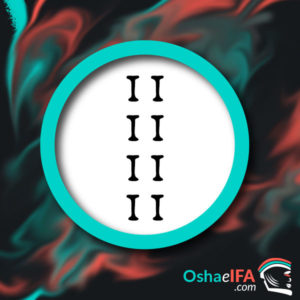




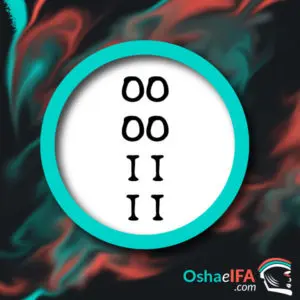
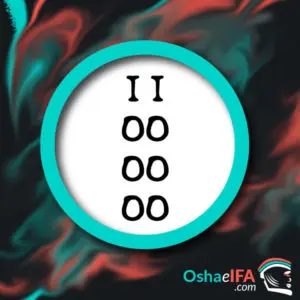
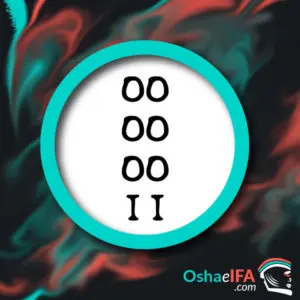
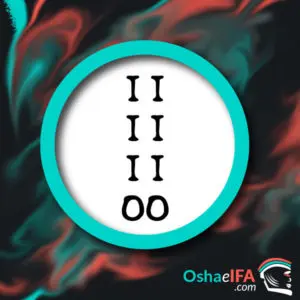
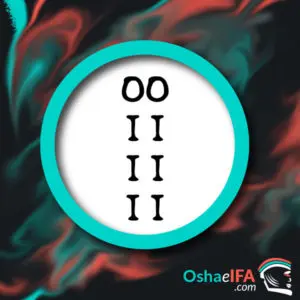
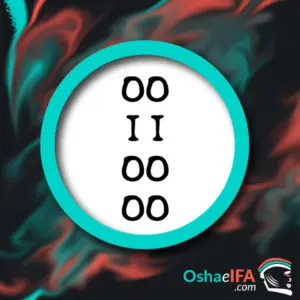
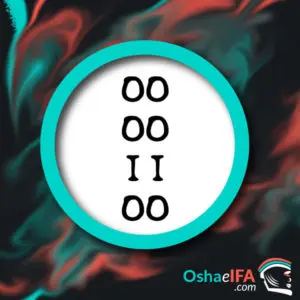
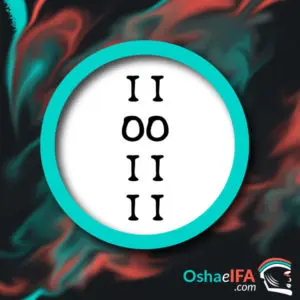
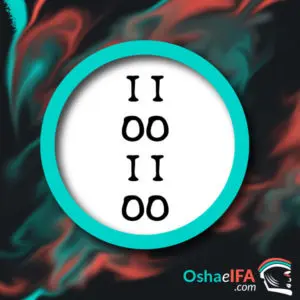

Please 🥺 send more info about irete meji
This is my oddun. I am a woman? and I think it is difficult for a woman, it is like carrying an Ifa priest inside and not being able to express yourself, maferefun orunmila